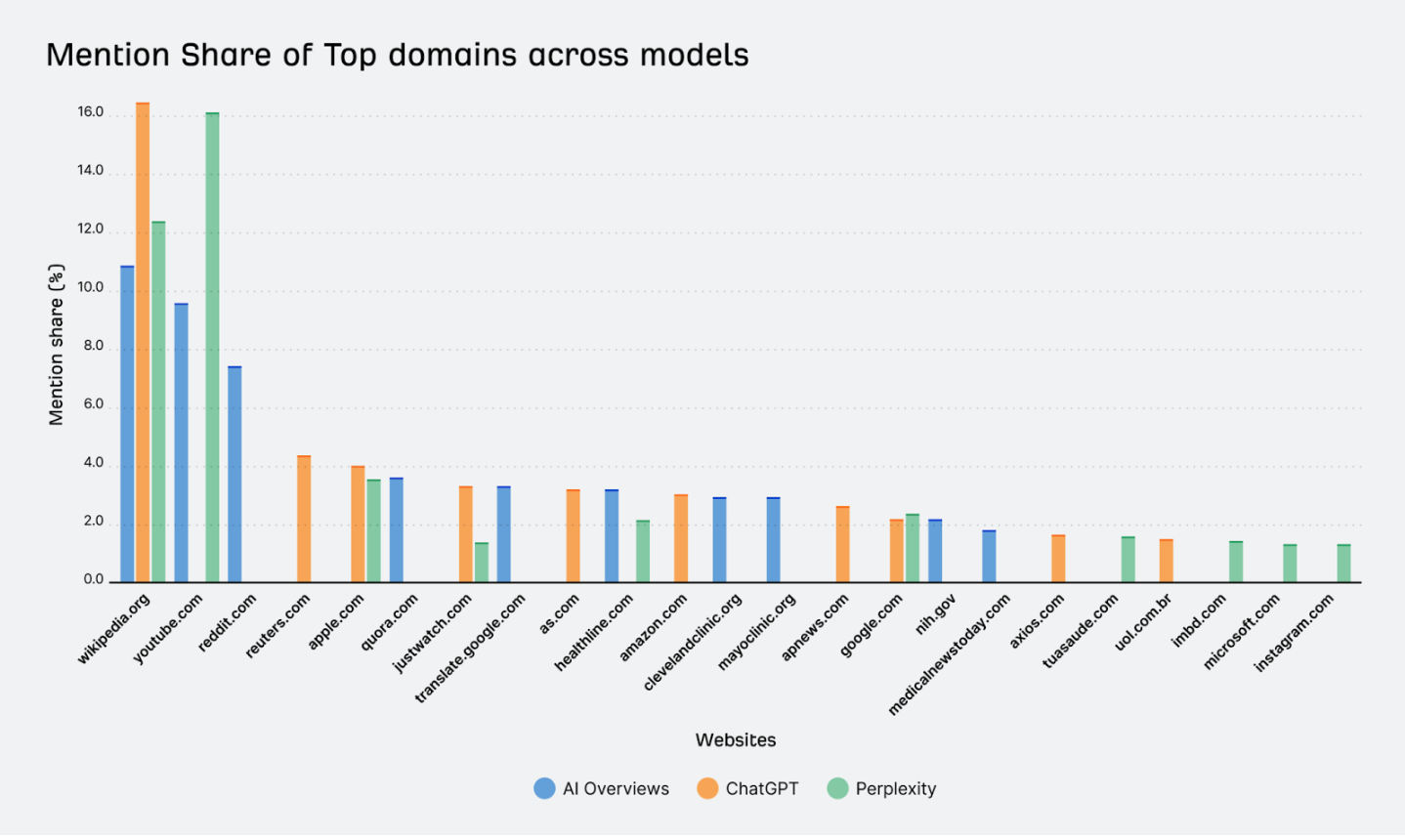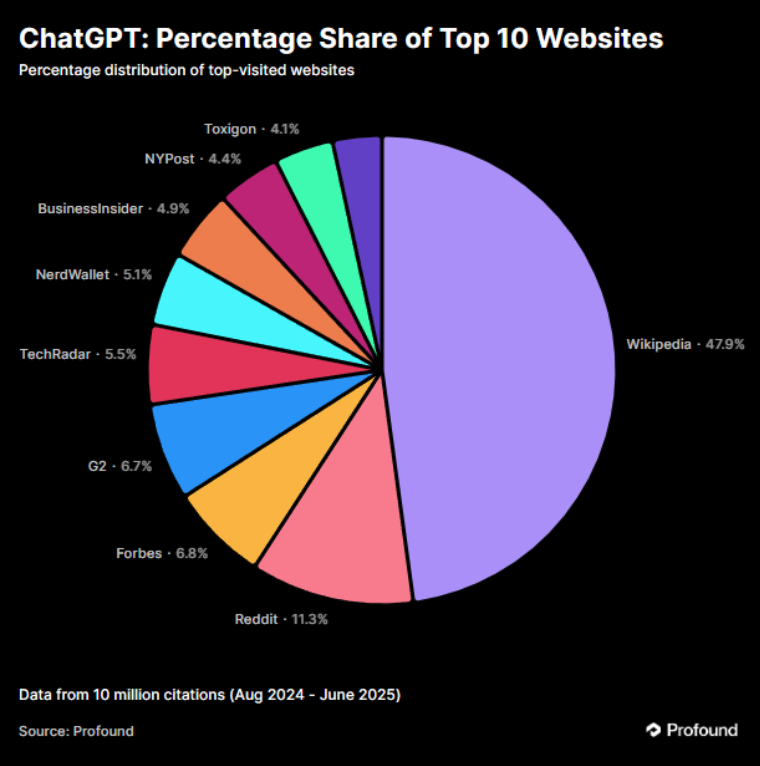How AI Tools Like ChatGPT, Google, and Perplexity Choose Their Sources and What It Means for SEO
AI is changing the way that people search. ChatGPT, Google’s AI Overview, and Perplexity work by pulling answers from other sites. But which ones? And why? Below, we’ll go over how these platforms choose what to show and what it could mean for the future of SEO.
Why AI Citations Matter for SEO
Search is changing. Instead of clicking through a list of links, users now get complete answers at the top of the page. A lot of the time, they don’t even have to scroll. This shift is pushing SEO into uncharted territory. You may hear terms like GEO (Generative Engine Optimization) or AEO (Answer Engine Optimization). ChatGPT, Perplexity, and Google now decide what people see first.
Looking for an AI Audit to understand your visibility?
Contact Eyeful Media for a comprehensive AI readiness audit.
Study 1: Ahrefs’ Analysis of AI Citation Patterns
Ahrefs examined how different AI platforms choose their sources. Their research clearly shows which sites appear most often and what that means for SEO.
Study Scope and Method
Ahrefs used its Brand Radar tool to study how often domains appeared in AI answers. The analysis covered a massive dataset: about 76.7 million Google AI Overviews, 957,000 ChatGPT, and 953,500 Perplexity prompts. This showed patterns in how often different sites were cited.
User Stats and SERP Penetration
ChatGPT currently has around 800 million weekly active users, including 15.5 million Plus subscribers and 1.5 million Enterprise users. It handles more than 1 billion queries every day.
Google’s AI Overview appears in 9.46% of all desktop searches. In the U.S., that number is close to 16%. In terms of volume, it appears in over half of all Google searches.
Top Cited Domains Across Platforms
Wikipedia leads across all three platforms:
ChatGPT: 16.3%
Perplexity: 12.5%
Google AI Overviews: 8.4%
YouTube shows up often in:
Perplexity: 16.1%
Google AI Overviews: 9.5%
But not in ChatGPT’s top list
Google’s Overviews also favor Reddit (7.4%) and Quora (3.6%). These sites don’t show up in ChatGPT or Perplexity’s top 10.
ChatGPT frequently cites news outlets like Reuters, Apple News (AP), and AS.com, each making up 2.6%–4% of citations. These don’t appear as much on other platforms.
Health sources vary as well. Google highlights sites like the Mayo Clinic and the Cleveland Clinic. Perplexity uses more niche ones like tuasaude and alodokter. ChatGPT doesn’t include any in its top 10.
Impression Share and Platform Biases
Ahrefs also looked at “Impression Share,” which measures how often a domain shows up based on keyword search volume. It gives a sense of how visible a site is, not just how many times it’s mentioned. This helps show which platforms favor which sites and which sites get the most exposure.
Study 2: Profound’s Deep Dive into 30 Million AI Citations
Profound ran a second large-scale study examining how frequently AI tools cited different websites. The study tracked 30 million citations from August 2024 through June 2025. Each platform showed its own patterns, and there were some significant differences in which sites they relied on.
Study Scope and Timeline
This study covered 30 million citations over ten months. Each platform showed clear preferences:
ChatGPT focused a lot on Wikipedia and major media sites like Forbes and Reuters.
Google AI Overviews showed a more balanced mix, pulling from Reddit, LinkedIn, Quora, and YouTube.
Perplexity leaned toward community-heavy sources such as Reddit, Yelp, and TripAdvisor.
These differences indicate that each platform “trusts” different types of content.
ChatGPT Citation Patterns
Wikipedia made up nearly half of ChatGPT’s top citations, about 47.9%.
Other top sources included:
Reddit: 11.3%
Forbes: 6.8%
G2: 6.7%
TechRadar: 5.5%
NerdWallet: 5.1%
Business Insider: 4.9%
New York Post: 4.4%
Toxigon: 4.1%
Reuters: 3.4%
This list shows a mix of crowd-sourced forums, finance sites, and major news outlets.
Google AI Overviews Citation Patterns
Google’s AI results included a wider variety of sources. Their top mentions were:
Reddit: 21%
YouTube: 18.8%
Quora: 14.3%
LinkedIn: 13%
Gartner: 7.1%
NerdWallet: 5.9%
Forbes: 5.7%
Wikipedia: 5.7%
Business Insider: 4.5%
Medium: 3.9%
This reflects Google’s broader ecosystem, mixing professional content, user posts, and videos.
Perplexity Citation Patterns
Perplexity leaned most heavily on Reddit, with about half its top citations (46.7%) coming from there. Other top sources included:
YouTube: 13.9%
Gartner: 7.0%
Yelp: 5.8%
LinkedIn: 5.3%
Forbes: 5%
NerdWallet: 4.5%
TripAdvisor: 4.1%
G2: 4.0%
PCMag: 3.7%
Perplexity tends to favor discussion-based and review-heavy platforms.
Platform Citation Implications
Each tool has its own habits when it comes to sources:
ChatGPT relies heavily on Wikipedia, comprising media and finance content. Keeping your brand visible on these sites might increase your chances of getting cited.
Google AI Overviews give space to a broader group of sources, especially those in its network, like YouTube and LinkedIn.
Perplexity puts a lot of weight on online discussions and review platforms, especially Reddit.
What It All Means: Navigating the Future of Search
These studies clarify that AI tools shape how people find and view information online. Also, they’re not pulling from the same list of sources. If you want to stay visible, it might be time to think beyond traditional SEO.
Wikipedia Still Matters
Wikipedia appears on all platforms. That means keeping your brand’s Wikipedia page accurate and current is still valuable. If your company or content is missing from there, it may not appear in AI-generated answers.
Community and Forum Content is Gaining Authority
Sites like Reddit and Quora are now primary sources for Google and Perplexity. Joining conversations in the right spaces, or having content people link to there, makes a difference. These platforms are no longer just for casual browsing. They’re a part of how people get their information.
Citation Bias Highlights the Value of Trusted Media
Each platform has its favorites. ChatGPT leans into media and financial news. Google gives more weight to its own properties, like YouTube and LinkedIn. Perplexity goes deep into online discussions and product reviews. If your content appears on sites they pull from, you are more likely to be seen.
Prepare for Reduced Organic Clicks
With AI giving users complete answers up front, fewer people click on websites. That could mean less traffic, especially for top-of-funnel content. Perplexity is even rolling out direct shopping features with Firmly.ai. This way, users can buy without ever visiting a store’s site.
Diversify Visibility Channels
Search is still important. However, it’s not the only place to be found. More brands are learning into email, social media, and other direct ways to reach their audience. If AI platforms change what appears in search, these different channels can keep your traffic steady.
Actionable Next Steps: Preparing Your Site for the New AI Search Landscape
The research from Ahrefs and Profound shows that AI-powered tools like ChatGPT, Google’s AI Overviews, and Perplexity don’t just list search results. They choose sources they trust.
Each platform favors different types of content and websites, so your SEO strategy must adapt if you want to stay visible.
Below are practical, focused steps to help you get ready. These recommendations cover both broad and platform-specific strategies, technical improvements, content adjustments, and brand-building tactics designed to align your site with how AI engines now surface and cite content.
General Strategy: Embracing GEO and AEO
The findings make one thing clear: AI answer engines aren’t just scraping content. They’re curating it. That means your site needs to be optimized for how these systems pick sources. Here’s how to prepare:
Write in answer-friendly formats: Use clear headings that align with search questions. Provide direct, authoritative answers right away. Break up content with lists, tables, FAQs, and How-To sections to make it easy for AI and readers to parse.
Implement structured data: Schema types like FAQ, HowTo, Article, and Review help search engines and LLMs better understand your content. This can improve your chances of being chosen as a trusted source.
Strengthen your brand and author credibility with Google E-E-A-T: Include detailed author bios with real credentials. Make sure your About and Contact pages clearly establish who you are and why you’re trustworthy. Build external references that reinforce your expertise.
Promote your content across multiple channels: Don’t rely on your website alone. Share your content on social media and other platforms that AI engines trust and cite.
Platform-Specific Action Steps
Each AI platform relies on its own mix of sources. Understanding these patterns helps you tailor your strategy to increase the chances of being cited. Here’s how to think about approaching ChatGPT:
ChatGPT Strategy
Studies show ChatGPT strongly prefers certain types of sources. Nearly half of its top citations come from Wikipedia, with frequent mentions of mainstream media outlets like Reuters and Forbes. It also leans into finance and tech sites such as G2 and TechRadar.
How to improve your visibility with ChatGPT:
Aim for Wikipedia mentions: Getting your own page isn’t always realistic, but even being cited or mentioned on related Wikipedia pages can improve your visibility.
Secure media coverage: Pursue PT opportunities to earn mentions in trusted outlets like Forbes, Business Insider, and Reuters. Tools like HARO (Help A Reporter Out) can help you get quoted by journalists.
Contribute to niche, authoritative sites: Consider guest posting or securing features on vertical-specific sites. For example:
Finance: NerdWallet, Business Insider
Tech: TechRadar, TechCrunch
Publish reliable, evergreen content: ChatGPT rewards factually solid, well-researched content that can stand the test of time. Focus on unique case studies and research that AI and readers can’t get elsewhere.
Perplexity Strategy
Perplexity shows a strong preference for community-driven and review-heavy sources. Nearly half of its top citations come from Reddit, with significant weight also given to platforms like YouTube, Yelp, TripAdvisor, LinkedIn, G2, and PCMag. This highlights how much it leans on authentic discussions and user-generated content.
How to improve your visibility with Perplexity:
Invest in community marketing: Be active on platforms where people discuss and review products or services. That means participating meaningfully on Reddit, Yelp, and TripAdvisor. Share insights naturally and respond to questions without being overly promotional.
Claim and optimize your business listings: Make sure your 3rd party profiles are complete and accurate. Include high-quality photos and keep your business information up to date. Regularly monitor and respond to reviews to show engagement.
Create video content for YouTube: Focus on formats that work well for AI summarizers, like explainer videos, reviews, and comparison content. This helps position your brand as a trusted source for the types of queries Perplexity is likely to answer. Also, upload the transcript to your website for additional context.
Encourage customer reviews: Build credibility on platforms that Perplexity favors, such as G2, Yelp, and TripAdvisor. Positive, authentic reviews can help boost your presence in AI search engines.
Establish thought leadership on LinkedIn: Share insights, publish articles, and engage with your professional community. LinkedIn is one of the key sources Perplexity turns to for authoritative content.
Ready to explore how AI fits into your team’s work? Watch our recent webinar on how to integrate AI workflows into your Paid Search strategies and operations or schedule an AI Readiness Audit to get a baseline of how well your brand is positioned to capitalize on AI driven search.


